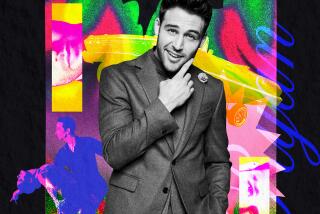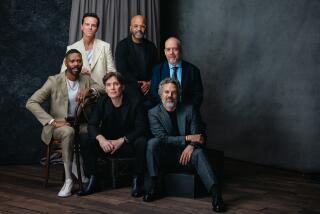ROLE PLAYING : Nice Geeks (Named Zak) Finish First
- Share via
One major New York critic suggested that his name sounded suitable for an extraterrestrial, while another pegged it as appropriate for a weatherman. But these observations merely served as a preamble to the raves both reviewers wrote about Zak Orth’s performance as a hysterical young man out to avenge his mother’s disgrace in a recent off-Broadway production of George Bernard Shaw’s “Misalliance.”
And with the release of the new Kevin Kline film, “In & Out,” in which Orth plays one of a group of high school students who must contend with the news that their favorite teacher is gay--he’s the one who incoherently tries to explain the anatomical correctness of “in-holes” and “out-holes”--Orth’s odd moniker is likely to become even more familiar.
“Actually I was born Adam Zachary Orth,” the large, slightly heavy young man says in the patio of a Chelsea restaurant not far from the apartment he shares with his wife Heidi, a graphic designer. “Zak is short for my middle name. I was never called Adam.”
The name, in fact, along with the stature and mild manner, suits an actor who has made something of a career playing geeks, outsiders and iconoclasts in stage productions such as Eric Bogosian’s “Suburbia” and Anton Chekhov’s “The Three Sisters,” and on film in Baz Luhrmann’s “Romeo & Juliet” and David Russell’s “Spanking the Monkey.”
The attention that’s now starting to come his way is as surprising to Orth, 27, as the fact that he hasn’t had to work a day job since 1994, when he won the role of Pony in the Lincoln Center production of “Suburbia.” Dressed in conservative slacks and sweater, he displays an intelligence that seems to fly in the face of some of the characters he’s played.
Orth describes those hapless dudes as “souls lost in a sort of ignorance-is-bliss soup.” As such, he quips, he had no trouble identifying with them. “It didn’t take any research for me to play Mike [in “In & Out”] or any of these other clueless guys,” he says. “They’re all in this adolescent sleep out of which I’m only now arousing myself.”
The actor certainly knows the social context of guys like Mike and Pony, having grown up in Libertyville, Ill., a sleepy suburban community of 20,000 near the Wisconsin border. Asked how “In & Out” might play at the Libertyville cineplex, Orth says, “Homophobia is manufactured in high schools so it’s probably useful to keep in mind that it really does bother people. But I think most people are smart enough that when they are challenged by a film that is all about how stupid it would be if they didn’t like a guy just because he was gay, they’d know enough to sit there and go, ‘OK, I will like this movie and this guy.’ Otherwise, you’d have to be pretty thick-headed.”
The son of an opera star and a piano teacher, Orth says that his family and friends defied many stereotypical notions of repression laid on both suburbs and the Midwest. His father, Robert Orth, performed with many regional companies and most recently created the title role in the opera “Harvey Milk” by Stewart Wallace and Michael Korie that premiered at Houston’s Grand Opera and then played New York City and San Francisco. From his father, Orth says, he learned to be “fearless” in his choices and to consider himself “lucky” that he is doing what he loves and is paid for it. “I grew up around backstage and that clinched it for me,” said Orth.
As a child, Orth says he was shy, neither the class clown nor “the obnoxious theater speech-team kind of guy.” In fact, he recalled, when he was performing in “Three Sisters” at Chicago’s Goodman Theater, a member of the company met someone who had gone to high school with Orth and had asked what the actor had been like then. “He told him, ‘He didn’t make any sort of an impression at all.’ ”
After graduating from theater school at Chicago’s DePaul University and moving to New York, Orth made an impression on director Robert Falls, who cast him in the role of the mellow “B-list” rock star in “Suburbia” even though Bogosian had originally envisioned the character as skinny, long-haired and hard-edged.
Director David Warren, who saw Orth in the production--which ran for five sold-out months in New York--later cast him in “Misalliance.” “It was one of those moments when an actor makes an immediate and vivid impression,” Warren says. “What worked so beautifully in ‘Suburbia’ was that you knew by looking at him that he was the last one in the group you would have expected to be successful--he was so ordinary. But he was very believable as this geeky suburban guy who’d become a rock star. Zak’s going to make his career by changing people’s minds about skinny characters.”
Orth says that the failure of the original New York cast to win roles in Richard Linklater’s film of “Suburbia”--with the exception of Steve Zahn and Samia Shoaib--was a major disappointment but what helped take the edge off was being cast as Gregory, one of the swaggering toughs in the opening scenes of “Romeo & Juliet.”
His favorite role to date, however, is the one in “Spanking the Monkey,” a darkly comic movie about incest and teenage confusion.
“That’s the film closest up my alley,” he says. “It’s smart and funny and painful and honest. I discovered . . . the films of Monty Python and [British television shows] like ‘Fawlty Towers’ and found I could relate to that comedy of aggression, comedy of the cruel. . . . Actually, I could find that funny, too. This is a creepy area, analyzing what’s funny or not. I know I could love finding new ways to fall down.”
More to Read
The biggest entertainment stories
Get our big stories about Hollywood, film, television, music, arts, culture and more right in your inbox as soon as they publish.
You may occasionally receive promotional content from the Los Angeles Times.










